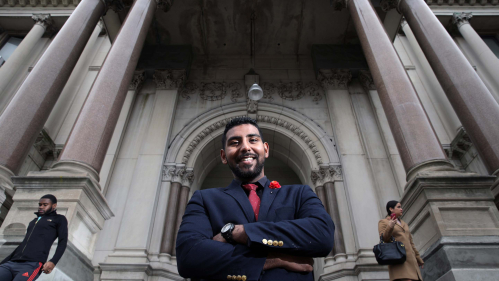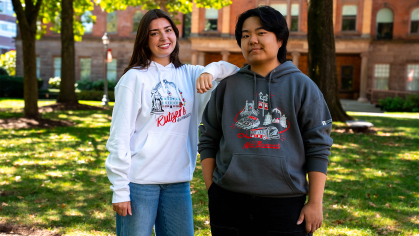Rutgers-Newark Graduate Awarded Soros Fellowship Honoring Immigrants

Rutgers-Newark graduate Mussab Ali, who in 2017 became the nation’s youngest Muslim elected official after winning a seat on the Jersey City school board, has been awarded a Paul & Daisy Soros Fellowship.
The annual award, part of Soros’ New Americans program, honors immigrants and children of immigrants by recognizing those who are poised to make a significant contribution to U.S. society, culture, or their academic field.
The $90,000 fellowship for students pursuing a graduate education will help Ali complete his education at Harvard Law School, where he is a second-year student.
Ali said the support is a meaningful validation of his work. “The thing about the Soros award is it’s about this idea that immigrants can come here and chase their version of the American dream,’’ said Ali. “One of the things I’ve realized is how lucky I am to be an American and how American my story really is.’’
Ali, who immigrated to Jersey City from Pakistan as a child in 2000, was a student at Rutgers-Newark when he made his first run for the Jersey City school board in 2016, fueled by his opposition to Donald Trump’s divisive, anti-immigrant rhetoric, he said. Although he lost that race, he won a seat the following year. At age 20, while still attending Rutgers-Newark, he became the youngest elected official in the city’s history and the youngest Muslim elected official in America. In 2021, he was elected board president.
Ali was a pre-med student with no political aspirations and little knowledge of municipal government when he decided to run. But he was so angered by Trump’s bogus claim that “thousands” of Muslims in Jersey City were cheering as the Twin Towers fell, he felt driven to act. It evoked memories of the discrimination faced by his parents in the aftermath of 9/11, when his father was laid off from his job and his mother, a teacher, was subjected to verbal and physical prejudice because she wore a hijab.
“As a loyal son of Jersey City and a Muslim American, I felt I had to stand up for my hometown and all Americans who lived there,’’ Ali, who is also an alum of the Eagleton Institute of Politics' Undergraduate Associates Program, wrote on his website.
The thing about the Soros award is it’s about this idea that immigrants can come here and chase their version of the American dream. One of the things I’ve realized is how lucky I am to be an American and how American my story really is.
Mussab Ali
At Rutgers-Newark, Ali began learning about local politics and decided the Jersey City school board needed a student’s voice. Many were not receptive. “I remember facing Islamophobia and a lot of comments about my religion,’’ said Ali. “In 2015, when I went to the board asking for Eid to be a district holiday, I heard, ‘you should move somewhere where Eid is a holiday.’’’
But after he was elected, Ali successfully lobbied to get Eid declared a school holiday and gained approval for halal school lunches, along with votes for dress code reforms and increased recycling efforts. He also helped balance a budget deficit of over $70 million.
His fellow officials, and the public, quickly began to view him as an effective leader. “I was probably the most prepared person in the room in terms of doing the research and showed that I was someone who was willing to work with people. At the end of the day, I was able to get things done.’’
Ali credits Rutgers-Newark with nurturing his pursuit of local office and his passion for civil rights. “I was surrounded by classmates who had a desire for change. I think the campus attracts that,’’ he said. “There are a lot of students that come out with this vision and this eye toward making the world a better place. The courses I took informed the way I was thinking about politics and policy.”
Rutgers-Newark Chancellor Nancy Cantor also became a mentor. “She had faith in me,’’ he said.
According to Cantor, Ali’s potential was evident early on. “He always has had his eye on the values of his culture and faith that can unite people, groups, and traditions in common purpose,’’ she said. “As a student leader at Rutgers-Newark, he listened acutely and was constantly thinking ahead about building, galvanizing, supporting others, but also about the organizational and institutional potential to make a difference. He already has shown himself to be a leader of future leaders.”
Ali is one of 30 recipients of the 2022 fellowship, selected from more than 1,800 applicants. He is the third Rutgers graduate to earn a Soros fellowship and had previously been named a Harry S. Truman Scholar and Schwarzman Scholar.
“It is difficult to imagine a more deserving candidate for the Soros Fellowship than Mussab Ali,’’ said Arthur D. Casciato, director of Rutgers’ Office of Distinguished Fellowships. “Mussab is that singular young man who knows exactly who he is and what he wants to accomplish.”
Ali is co-founder of the Ali Leadership Institute, a non-profit that aims to train the next generation of urban-based youth leaders and increase civic engagement. His co-founder is youth activist Abeera Saeed.
After graduating from Rutgers-Newark in 2019, Ali was accepted into Harvard Law School. But in 2021 he was diagnosed with Stage 4 Hodgkins Lymphoma. Ali underwent 12 rounds of chemotherapy during the pandemic, when he was isolated from friends and family.
He is now in remission, and although he has stepped down from the school board, he has continued his studies at Harvard.
Ali’s battle with the disease has reaffirmed his sense of purpose. “When you ask yourself, what do I want in life, what I was grateful for is that I was doing what I wanted to be doing,’’ he said. “In all my roles, I’ve embraced the diversity of Jersey City and I was able to fight for these marginalized communities. I just wanted to continue to invest my education back into my community. I found that service was my purpose in life.”


